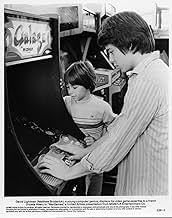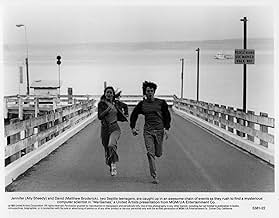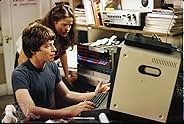Ein junger Mann findet eine Hintertür zu einem militärischen Zentralcomputer, in dem die Realität mit dem Spiel verwechselt wird, das möglicherweise den Dritten Weltkrieg auslöst.Ein junger Mann findet eine Hintertür zu einem militärischen Zentralcomputer, in dem die Realität mit dem Spiel verwechselt wird, das möglicherweise den Dritten Weltkrieg auslöst.Ein junger Mann findet eine Hintertür zu einem militärischen Zentralcomputer, in dem die Realität mit dem Spiel verwechselt wird, das möglicherweise den Dritten Weltkrieg auslöst.
- Regie
- Drehbuch
- Hauptbesetzung
- Für 3 Oscars nominiert
- 4 Gewinne & 14 Nominierungen insgesamt
Empfohlene Bewertungen
Seattle high schooler David Lightman (Matthew Broderick) has only a few hours to undo what he thought was a sneak preview of an upcoming computer game but what instead got him tinkering with the U.S. Air Force's WOPR (War Operation Planned Response) computer system in such a way as to trigger a countdown to World War III. The FBI thinks he's a Soviet spy, while classmate Jennifer Mack (Ally Sheedy) is wondering if this isn't all really about a rejiggered biology grade.
Broderick is solid, and Sheedy even better, but what really sells this film is everything else. Start with the excellent supporting performances. John Wood as a reclusive professor and Barry Corbin as a tobacco-chewing general get much of the kudos, and rightly, but there's a whole deep bench of quality work beyond that, like Kent Williams as a curt White House advisor, William Bogert and Susan Davis as David's out-of-it parents, Alan Blumenfeld as the swaggering bully of a biology teacher, and Juanin Clay as a beautiful but underappreciated assistant (even by herself as she uses her own mouth as an ashcan for her boss's discarded gum.) You know the casting people behind this movie were on the ball when the opening sequence features two very recognizable faces, those of Michael Madsen and John Spencer, in what were film debuts for both.
That sequence with Madsen and Spencer as missile men point up another quality of "WarGames," the way the movie works in terms of setting up expectations and developing pace. The harrowing business between the two of them is mercilessly presented ("Turn your key, sir!") and then effectively abandoned so as to work in the central storyline, the replacement of these men with computers. We get a macro-view where Dabney Coleman as a tunnel-visioned warroom executive effectively makes the case for "taking the men out of the loop" and then zoom back into what seems a totally unrelated story, that of slacker teen David Lightman and his high school travails.
The film could have just started with Lightman, and worked its way out to the business with the WOPR. But the early peek behind the curtain is a clever way of raising the stakes with the audience before the protagonist realizes what's up.
The set design, cinematography, lighting, and editing all work wonders as well. The NORAD warroom is really a character onto itself, the ultimate source of reality in this film (and better for my money than the warroom in `Dr. Strangelove,' an obvious inspiration.) The way the cameras dart around from terminal to terminal as uniformed USAF technicians follow the progress of an apparent Soviet attack, lighting onto one of them just before he or she relays an important piece of information, is highly addictive and entertaining.
There's some sloppiness in the movie. Madsen and Spencer's talk about this great pot Spencer's character has scored strains credulity in the high-security setting they are in, and its blindingly obvious that the two men we see exiting a helicopter and entering a jeep during the credits are not the same two men getting out of the jeep moments later. The musical score is terrible, except for the elegiac tune at the end by which time it's too late. And there's no real examination of the morality of Lightman's serial lawbreaking.
But this is a funny, exciting, consciousness-raising movie that is as entertaining now with the Cold War more than a decade behind us as it was all those years ago. For all the technical innovation on display, it's ironically appropriate we remember it for showing us how to butter an ear of corn, because it's the human side of the equation `WarGames' keeps in its sights at all times.
[The DVD features a terrific, candid commentary from director John Badham and writers Lawrence Lasker and Walter Parkes that gives one a real appreciation for the value of creative license as well as factual diligence in making a film of this kind work.]
And the last ten minutes or so are still jaw-dropping. That spectacular (if implausible) NORAD set is as astounding as ever, and the last line still deserves it's place in the pantheon.
Laugh at the antiquated tech by all means, but be impressed by the effort taken to make it feel believable (cf. the sequence where Broderick's character gets the password for the school computer.) Hacker movies have rarely come this close to being real - and, as someone who had been there and done that at about that time, it was scarily right.
In no way is this one of the greatest movies ever made. But there's no question that it achieves the rare quality of transcending it's genre.
Broderick is well-cast and this is probably one of the roles, along with Ferris Bueller, that stereotyped him as a continual teenager--which makes it hard for him to get adult roles nowadays. (He's in the upcoming remake of "The Producers"--yay!)
Ally Sheedy and Dabney Coleman both have supporting roles.
I thoroughly enjoyed this film and rate it a solid "4" of five stars.
Trivia note: Sheedy and Broderick both appeared in separate movies by John Hughes: "Ferris Bueller's Day Off" and "The Breakfast Club."
Matthew Broderick is David Lightman, a young computer gamer geek who is something of a whizz kid on the PC. He can change his school grades and hack into various sites he shouldn't be even looking at. During one eventful sitting he hacks into a computer called Joshua and plays a game called Global Thermonuclear War, he harmlessly chooses to be The Soviet Union and proceeds to launch a nuclear attack on his own country, the U.S.A. Trouble is, is that the game is for real and the wheels are in motion for World War III!.
It helps to remember the time this film was made (for those old enough of course), for it was the time of the ever worrying cloud of the Cold War, a time when nuclear war was more than a hearsay threat. I really think that in this day and age where computers literally do run our lives, this film stands up really well not only as a warning piece about messing with technology, but also as a gentle poke in the ribs about defence systems and the people we trust to run them. Though the film is a kind of watered down and accessible 2001: A Space Odyssey for the 80s set, it impacts well and only really suffers from a pointless romantic plot strand involving the sprightly Ally Sheedy (could they not just have been pals?) and the aforementioned dated gadgets. The ending to the film is excellent as the tension builds up nicely and we are left chewing our nails watching a game of Tic-Tac-Toe, sounds simple doesn't it? Not so.
Good honest and intelligent entertainment. 7.5/10
Wusstest du schon
- WissenswertesThe studio had the Galaxian (1979) and Galaga (1981) arcade machines delivered to Matthew Broderick's home. He practiced for two months to prepare for the arcade scene.
- PatzerWhen WOPR is searching for the launch code, it is shown to be able to lock onto each digit individually. In which case, it would only take 360 tries (one for each letter and digit), to definitely find the entire code.
- Zitate
[after playing out all possible outcomes for Global Thermonuclear War]
Joshua: Greetings, Professor Falken.
Stephen Falken: Hello, Joshua.
Joshua: A strange game. The only winning move is not to play. How about a nice game of chess?
- Alternative VersionenIn the International-dubbed prints and the U.S. TV premiere, in the scene where the female airmen is counting down to Impact, there is more background music that plays than in the original version.
- VerbindungenEdited into Crosby, Stills & Nash: War Games (1983)
- SoundtracksVideo Fever
Performed by Arthur B. Rubinstein, Cynthia Morrow, Brian Banks and Anthony Marinelli (as The Beepers)
Lyrics by Cynthia Morrow
Music by Arthur B. Rubinstein
Produced by Anthony Marinelli (uncredited)
Top-Auswahl
- How long is WarGames?Powered by Alexa
- Does General Barringer have the authority to launch ICBM's?
- Why is Jennifer in the NORAD war room?
- Why did the FBI take David to NORAD from Seattle just to question him?
Details
- Erscheinungsdatum
- Herkunftsland
- Offizieller Standort
- Sprache
- Auch bekannt als
- Juegos de guerra
- Drehorte
- Anderson Island, Washington, USA(Goose Island scenes)
- Produktionsfirmen
- Weitere beteiligte Unternehmen bei IMDbPro anzeigen
Box Office
- Budget
- 12.000.000 $ (geschätzt)
- Bruttoertrag in den USA und Kanada
- 79.567.667 $
- Eröffnungswochenende in den USA und in Kanada
- 6.227.804 $
- 5. Juni 1983
- Weltweiter Bruttoertrag
- 79.567.667 $
- Laufzeit1 Stunde 54 Minuten
- Farbe
- Sound-Mix
- Seitenverhältnis
- 1.85 : 1
Zu dieser Seite beitragen





































